Authentic evangelism begins with prayer. Prayer saturates our waiting. But it is not prayer in general. Authentic evangelism begins with intercessory prayer, the kind of prayer that takes us out of ourselves, moves us out of the bubble of our own lives. If we are not actively praying for people, we will never be able to effectively share the gospel with them.
This idea runs much deeper than simply praying that someone accept Christ – even though that is important. Like the longing that is part of human nature, prayer is also a distinctively human thing. The need to pray is as natural as our need for food or water. It is the instinctive way we seek to ease our restlessness and attempt to fill the hole within our hearts.
In prayer, as we reach out to something greater than ourselves, it does not take long for our minds to turn to the needs of others. This is because we are made in the image of a Triune God. Because our God is relational, so our praying is relational; it is how we are wired.
Yet though it is natural, prayer remains filled with mystery. At the heart of this mystery is the truth that for Christians, prayer is about the movement of God in our lives and in the lives of others. This may seem strange to some of us. It is tempting to associate prayer with getting an answer, especially the answer we have in our minds before we begin to pray. It is easy to reduce prayer to a process of getting what we want, when we want it; however, when we succumb to that temptation, we often become disappointed, even disillusioned, when things do not turn out as we had hoped. But prayer is about God’s movement in our lives and in the lives of others, and that understanding grounds everything else we say about it.
When we begin to make the connection between prayer as a movement of God in the lives of others with the call to be available to the Holy Spirit, the significance of prayer as an essential value of evangelism becomes evident. Because the need to be in relationship is a human need, not only a Christian need, prayer and authentic evangelism converge at our most human point of need – the need for relationship, the need for connection with God and others.
Like prayer, evangelism is about relationship; more specifically, it is about relationships of trust. People need to trust that we care, trust that we love them the way we say we love them – trust that we are not targeting them or judging them or trying to manipulate them.
The best foundation for authentic evangelism is a trusting, caring relationship. Relationships of trust and care allow us the space to share our faith and space for the Holy Spirit to work for transformation in our lives and in the lives of those we care about. Relationships of trust and care are fostered by prayer. As we pray for others we come to see them in a new light and our care for them deepens. Faith can only be shared when a depth of care and trust exists. If we do not care enough about the people we hope to reach for Christ to pray for them, then our commitment to sharing the gospel with them is likely not as deeply rooted as we think.
Incorporating those outside our community of faith into our prayers is not simply praying that they come to know Jesus Christ. Yes, that is our ultimate hope and that desire undergirds our praying. Yet we do not pray that others would accept Christ and then sit back and wait for that to happen. There is much more to intercessory prayer as an essential value of evangelism than that. Recognizing this points to the importance of immersing ourselves in the dynamics of intercessory prayer.
Authentic evangelism is not about browbeating or arguing with another person to wear them down; that change of heart comes only through the power of the Holy Spirit. In like manner, we do not pray to persuade or convince God. God does not need to be convinced that someone we know needs to become a Christian. God already knows that. In fact, God is likely already at work in that person’s life before we ever get involved.
Thus, our praying is not to convince God of the “right or best answer” – whether that be in the life of another or in our own lives. Because we are human, we do not have the wisdom to know what the truly right or best answer is. We can have inklings, we can have intellectual insight, but that is as close as we can come. More often, however, though we may not know that is right or best, we are quite clear about what we want. Unfortunately, what we want, at the moment we want it, is not always the wisest answer.
Early in my marriage, as I was completing my Masters of Divinity at Yale, I believed that God was calling me to pursue a PhD in Theological Ethics. Because my husband was in the middle of his surgical residency, I was limited in my choice of schools so I applied only to Yale. I fully believed I was following God’s leading by pursuing doctoral studies and prayed fervently that God would grant my desire to begin this work. When the acceptance letters were mailed, however, I did not receive one. My application was denied.
Prayer as an essential value of evangelism then is not about persuasion. It is about joining in God’s movement, in our own lives and in the lives of others. When we pray for others, we become connected to what God is doing in their lives. That connection propels our minds and hearts toward God. We become willing to create space for God’s Spirit to flow through our prayers and to others, speaking to them directly. This is key when we think about authentic evangelism.
It is not a matter of cut and dried petitions – God please make my friend a Christian, God please let me be accepted to graduate school. It is about being open to the way the Holy Spirit may be working through our prayers, not only to move others, but to move us. When we pray for others, we open ourselves to the working of the Holy Spirit in our own lives, not just in the lives of those we pray for.
Prayer is asking. It is a request. But here is the difficult truth: all prayer is answered but not all requests are granted. The mystery here is that there may be a discrepancy between the answer we receive and the answer we want. That was my painful discovery when praying about graduate school.
Yet, Karl Barth has said that God cleanses our prayers. God’s wisdom permeates the answer we receive. The wisest answer for me and graduate school was to not go at that time, even though I badly wanted to and passionately asked God to make it so. The wisest answer was no, so my request was denied. I did not get what I wanted.
God’s no was a crisis for me as I tried to discern my path in ministry. About a month later, however, I realized the wisdom in that answer when I discovered I was pregnant with our third child. The prospects of beginning a PhD program, pregnant, with two children under five, while married to a surgical resident were overwhelming. No was indeed the wisest answer.
This is a crucial point for authentic evangelism. We are not in control of the times or the seasons. God has granted each of us free will, so all our efforts to reach out to others with the love of Jesus Christ must respect that freedom. As we discussed in our last session, God never forces or coerces and neither do we. We may not see our supplication for another person granted; we may not see the dramatic change we are pleading for. And yet, as I mentioned earlier, when we pray for others, we come to see them in a new light. That is a transformation that takes place within us. It is a change in our perspective and attitudes; and that is often the most significant first step in God’s answer to our prayers. God answers by changing us, which is an answer we do not always recognize.

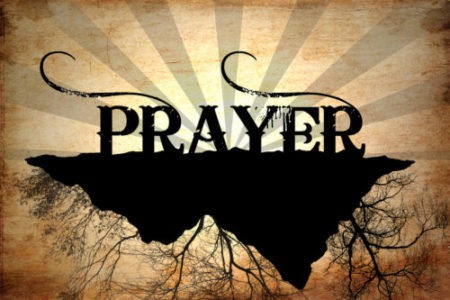

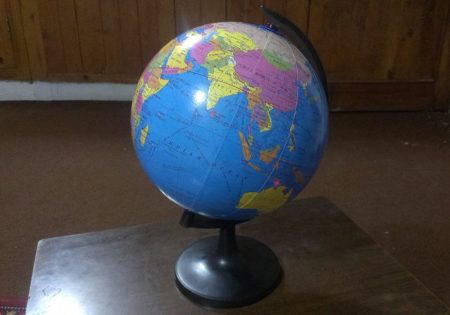

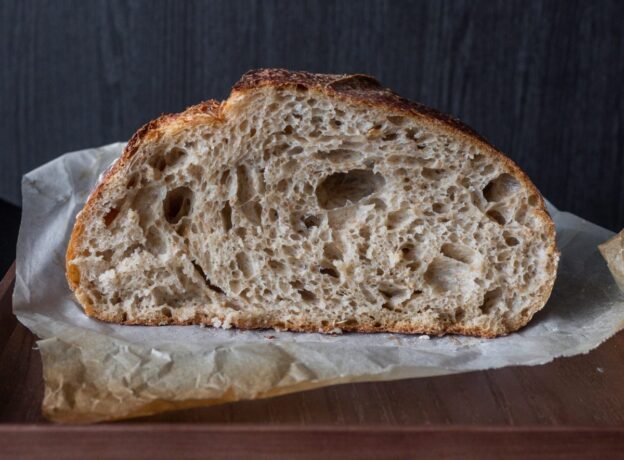
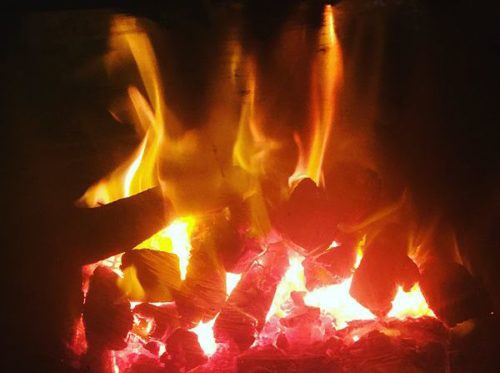

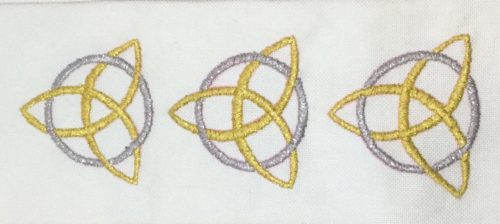
 The Triquetra, or Celtic knot, three leaves without beginning or end, is a Trinitarian symbol long associated with the Celts, but now popular in many other forums. With a circle entwined around it, the infinite mystery of God, without beginning and without end offers the artist and the viewer exquisite beauty that can be represented in infinite variations.
The Triquetra, or Celtic knot, three leaves without beginning or end, is a Trinitarian symbol long associated with the Celts, but now popular in many other forums. With a circle entwined around it, the infinite mystery of God, without beginning and without end offers the artist and the viewer exquisite beauty that can be represented in infinite variations. decisions about schedules, which bills must be paid, making judgments about whether your child needs correction or nurture? When do you find yourself being an intermediary, a conduit of communication for others, appealing on the behalf of a friend, a spouse, a sibling, a parent, or a co-worker to another? How are you seeking to sustain yourself as well as family members or friends, looking to guide others in their decision-making processes, to nurture yourself and the relationships that sustain you? Chances are, if you are like me, life and love are as complicated as they are simple. Any one action involves a host of motivations, needs and desires as we seek to act in faithful obedience to God and one another.
decisions about schedules, which bills must be paid, making judgments about whether your child needs correction or nurture? When do you find yourself being an intermediary, a conduit of communication for others, appealing on the behalf of a friend, a spouse, a sibling, a parent, or a co-worker to another? How are you seeking to sustain yourself as well as family members or friends, looking to guide others in their decision-making processes, to nurture yourself and the relationships that sustain you? Chances are, if you are like me, life and love are as complicated as they are simple. Any one action involves a host of motivations, needs and desires as we seek to act in faithful obedience to God and one another.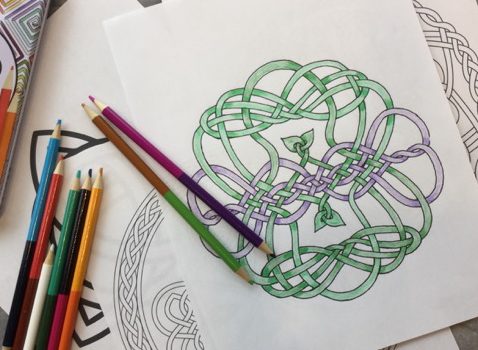
 Coloring reportedly helps reduce stress in adults as it requires the brain, nervous system and muscles to use fine motor skills and therefore engages the participant in a creative action. An added benefit is that it is a skill learned in childhood, so the simplicity of what was once work for a young child is now a pleasant pastime. Regardless of any nostalgia coloring may evoke, the action of coloring allows the mind to rest from the myriad of helter-skelter activities of modern-first-world-living that keep it occupied otherwise.
Coloring reportedly helps reduce stress in adults as it requires the brain, nervous system and muscles to use fine motor skills and therefore engages the participant in a creative action. An added benefit is that it is a skill learned in childhood, so the simplicity of what was once work for a young child is now a pleasant pastime. Regardless of any nostalgia coloring may evoke, the action of coloring allows the mind to rest from the myriad of helter-skelter activities of modern-first-world-living that keep it occupied otherwise. In a series of several posts, I plan to explore the heart of Celtic Christianity, what such a life of integration and integrity looks like for a contemporary Christian and why such a life is authentic to our Wesleyan heritage. Each post will consider aspects of everyday life that threaten to distract and distort us from living full lives that seek the sacred and find connection with the endlessly creative Triune God who created the universe.
In a series of several posts, I plan to explore the heart of Celtic Christianity, what such a life of integration and integrity looks like for a contemporary Christian and why such a life is authentic to our Wesleyan heritage. Each post will consider aspects of everyday life that threaten to distract and distort us from living full lives that seek the sacred and find connection with the endlessly creative Triune God who created the universe.